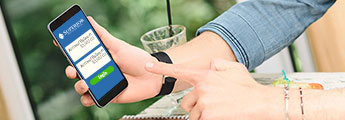Security
How We Protect You
Superior National Bank is committed to making sure that your personal and financial information remains secure. For over a century, we have endeavored to provide our customers with high-quality products and services that help ensure and maintain their privacy.
ATM/Debit Card Fraud Detection
What We Do: When we detect potential fraud on your Debit Card, we will alert you by text, automated phone call, and/or email.
Text Message – We will text you asking to verify if a suspicious transaction is legitimate.
Automated Phone Call (if there is no response to text message) – If you do not respond to our text, we will call you, identifying ourselves as Superior National Bank Fraud Center. You will be asked to identify yourself by entering the last four digits of your Social Security or Tax Identification Number.
- If you tell us the transaction is fraudulent, you will be transferred to a fraud specialist for further assistance and your card will be disabled.
- If you tell us the transaction is legitimate, nothing further is needed.
Email (if no response to text or call) – We will email you if we are unable to reach you by phone or text. You can reply directly to the email letting us know if the transaction in question is fraudulent.
What You Can Do
- Card Monitoring controls are built into the MySNB app or you can download the stand-alone app, SecurLOCK Equip from your mobile store.
- Contact us for assistance with disputing any unauthorized charges.
Lost or Stolen Card? Call us immediately toll free at 866.482.0404. If after hours, call 800.500.1044.
Online Banking Security
Encryption – Superior National Bank’s online products use the latest SSL (Secure Sockets Layer) and TLS (Transport Layer Security) technologies which encrypt sensitive information as it travels between your device and our secure servers. When you log in to your online session, your device establishes a secure connection with our servers which removes the ability for someone to intercept your information.
Secure Sign On – We use Advanced Login Authentication (ALA) security measures to identify you every time you log in. In addition to your User ID and Password, the other components consist of:
- Complex Device Profiling, which detects changes in your login patterns such as signing in from a different device or IP address.
- Out-of-Band Authentication (OOBA), which verifies your identity through the use of a one-time use security code that is provided outside the online channel through either an automated voice call or a text message to a number housed in our secure system.
Session Timeout – If your online account has been inactive for several minutes, the session will automatically sign you out. To resume using your account, you will need to reenter your username and password.
Firewalls – Your online account is protected by powerful firewalls that assist in preventing unauthorized information access.
Secure Messaging – You can send and receive secure messages through your online banking session.
Additional Security Measures – Mandatory and optional alerts, User ID harvesting prevention, last sign on date and sign on attempts, and more.
Privacy Notice
Please click here to view Superior National Bank’s privacy notice.
What to do if You Experience Identity Theft
If you suspect that you are a victim of identity theft or fraud, there are steps that Superior National Bank can take to help you. There are also ways that you can take action to help regain your credit and your name.
- Contact us immediately – The faster we know about your situation or suspicions, the faster we can act upon them. Call (906) 482-0404 or toll-free at (866) 482-0404 if you have any cause for concern. You may also use the secure message center to send a message on your situation. Click here for the secure message center.
- Contact all three major credit bureaus – You may wish to have a fraud alert attached to your file. Below is the contact information for each bureau.
- Trans Union: (800) 680-7289 or www.transunion.com
- Equifax: (800) 525-6285 or www.equifax.com
- Experian: (888) 397-3742 or www.experian.com
- Keep communication records – Be sure to hold on to all information regarding your situation including the event and resolution. It is a good idea to print relevant e-mails and take detailed notes regarding phone conversations.
- Report any crime to the local police – Be sure to provide the police with as much information as you can. Obtain a police report, as this may provide weight to any subsequent fraud case.
- Report any crime to the Federal Trade Commission (FTC) – Any information you provide may be shared with law enforcement around the world working to crack down on identity theft and fraud. You may also be provided with information that may be helpful in resolving your situation. Below is the contact information for the FTC.
- (877) 438-4338 or click here.
How to Help Protect Yourself
While there are many ways that Superior National Bank endeavors to monitor and stop fraud and identity theft, you are often the first person to notice that something is wrong. Here are a few tips on how to spot fraud and better safeguard your private information.
- Monitor your accounts. You know your accounts best. Carefully examine your statements and/or your online accounts. If something is off, contact us right away.
- Create a password that is strong and secure. Create a password that only you would know. Avoid using easy to guess places, people, dates, and number/letter sequences. Also, do not write down your password or give it out to anyone for any reason. Superior National Bank will never ask you to provide your password by e-mail, text message, telephone or any method of communication.
- Learn more about fraud and identity theft. If you are educated about the ways that fraudsters and thieves operate, you have a better chance of spotting and stopping the theft of your personal information.
- Carefully consider what you post on social networking sites. These sites can be used by thieves to gather information that they can then piece together and use illegally. Always keep in mind that thieves look for photos, addresses, birthdates, phone numbers, family history and any identifying information to make it easier for them to make you their victim. The internet has become the virtual mall for thieves to “shop” for this information.
- Check your credit report annually. This allows you to check that the report is accurate and report any suspicious or unauthorized credit applications.
- Do not give out your personal information. Do not give out information such as your social security number, debit card number, address, PIN number, account number, or password. Verify who you are speaking with before ordering, donating, or banking by phone.
- Remember that if something seems too good to be true, it probably is. If you win a contest/lottery you never entered and you’re asked to send money for ‘fees’ or ‘taxes’ before you receive your prize, report the request to Superior National Bank immediately. There is a very good chance this is a scam.
- Don’t open links in e-mails you never requested or find suspicious. These links sometimes allow for dangerous malware and computer viruses to be put onto your computer.















